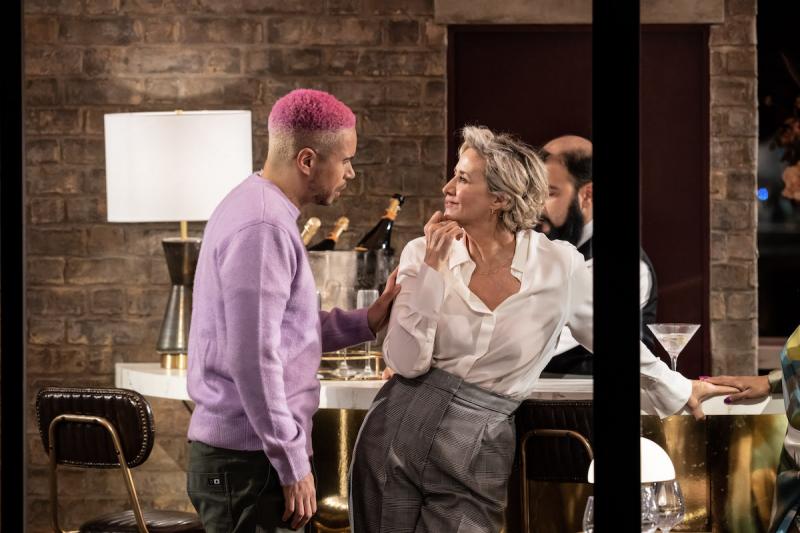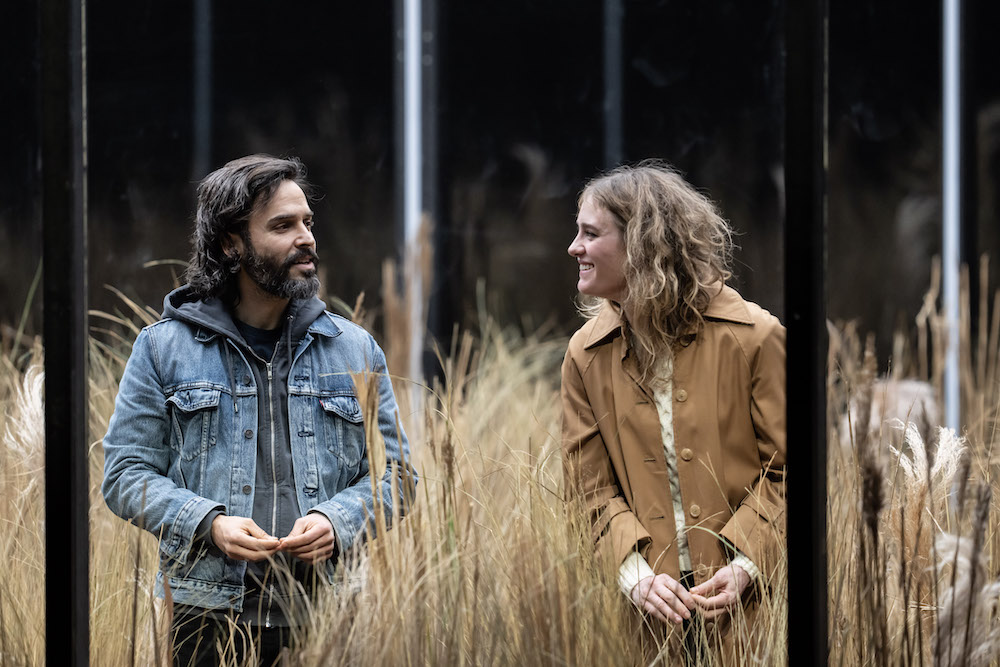Phaedra, National Theatre review - stunning acting in stunning show | reviews, news & interviews
Phaedra, National Theatre review - stunning acting in stunning show
Phaedra, National Theatre review - stunning acting in stunning show
Hotshot auteur Simon Stone creates a dazzling new myth for our times

How can old texts speak to us now? The point is not just to adapt classics, but to reimagine them – and that’s exactly what hotshot Australian director Simon Stone does. Having brilliantly staged Lorca’s Yerma with Billie Piper, he now turns his attention to Phaedra, creating an amazing and thrilling mash up of the myth as told by Euripides, Seneca and Racine.
Using the full resources of the National to great effect, and bringing Janet McTeer of Ozark fame back to the London stage, his superb reimagining also stars Assaad Bouab, who played Hicham Janowski in the original French series of Call My Agent. That’s what I call star casting.
In its original versions, the Ancient Greek tragedy is about Phaedra, a Cretan princess who marries King Theseus of Athens, and then falls in love with her stepson Hippolytus. He rejects her, so she accuses him of rape, which results in Theseus causing the death of his son, and Phaedra committing suicide. In Stone’s extensive retelling, the central character is Helen (McTeer), a wealthy middle-aged Shadow Minister, married to British-Iranian diplomat Hugo. The object of her passion is not a stepson, but Sofiane (Bouab), the exiled son of a Moroccan dissident musician with whom she had an affair decades earlier. Her memories of a former passion ignite desire for her old lover’s flesh and blood, mainly flesh.
Like many Greek tragedies, this is a family play. Helen, whose name suggests the Trojan wars, has two children: earnest older sibling Isolde and teenage, more insolent Declan. Isolde is married to ineffectual pink-haired hipster Eric, with whom her mother flirts – until she meets Sofiane. So although this is a completely different take on the myth than its source material, the central situation of a privileged woman having a deep passion for a younger man results in a similar tragedy. But the violence of Stone’s play is as much about emotional conflict as it is about physical pain.
Stone’s central theme is about situations when we fall in love with not so much the individual object of our desires as their ability to evoke memories of a previous love. So Helen is attracted to Sofiane because he looks like his father, whose love she still cherishes in her heart. Likewise, Sofiane is attracted to her because he remembers she was a significant presence in his childhood. The next step, of course, is that he also falls for Isolde, who looks like a younger version of Helen and thus evokes more memories of the past. If tragedy means destiny, and this is referred to in the text, then they can’t help themselves. You can easily see that this will not end well.
Helen is portrayed by McTeer with a stunning force in a performance that blazes through the play. The character is loud, arrogant and selfish, with a politician’s ability to twist truth and wriggle out of difficult situations. Mesmerising. Yet her domineering nature is poleaxed by her realisation of her uncontrollable passion for Sofiane, and in Stone’s hands she becomes very much a Greek or Renaissance woman whose desires take the form of delirium. Fever lust. However significant it is to put on stage a post-menopausal woman, and acknowledge that sexual desire continues into middle age, the play’s portrait of Sofiane is even more psychologically interesting.
This is because Stone, to cover the scene changes, includes voiceovers of a tape recording left by Sofiane’s father, Achraf, which express his sense of failure and his feelings towards his son. So the young man’s motivation is both to compete, in an Oedipal way, with his father for the love of the same woman, and also a way of trying to fix the family’s past traumas. Added to this, we get a good glimpse of his relationship to a Moroccan woman, as well as some sense of his anguish that Helen, when she visited Morocco in the early 1980s, was a privileged Western tourist who – in a kind of neo-colonialism – exploited the exoticism of its men. Bewitching them with sex and drugs (according to him).
There is also a strong feeling that Sofiane is treated by this dysfunctional family as an exotic visitor whose sexuality upsets all of their routines. In their rich Holland Park home, their complacency is challenged by this new arrival, whose sincerity and truthfulness is in sharp contrast to the ineffectual Eric and the browbeaten Hugo. If their relative unmanliness wilts in front of the Moroccan outsider, then by contrast Helen’s tormented soul comes into sharper focus. Although disturbed and vengeful women are something of a cliché in our culture – Doctor Foster and any number of Netflix series – they inhabit the world of Greek tragedy to perfection.
The acting has a freedom of movement and a hyper-naturalism that is very rare on British stages
Stone creates a coherent high-definition world for the play, placing his characters inside a revolving glass box, which puts the audience in the position of gods looking at the missteps of humans, and Chloe Lamford’s designs allow us to hang out in a classy kitchen and bedroom, a vacant high-rise office, the Sussex countryside, a top London eatery and a Moroccan mountainside. If the surtitles occasionally wobble in this multi-lingual production, the visuals are always beautiful and the acting is really first-rate. Likewise, Stefan Gregory’s sound design, with its mix of Philip Glass and Sufi music, works as a kind of chorus to the action.
As well as McTeer’s compelling performance, the acting has a freedom of movement and a hyper-naturalism that is very rare on British stages. Stone directs his cast to create a recognisable impression of real life, with an opening scene in which they talk over each other and create a truthful sense of what it’s like to come into someone else’s home for the first time. No clumsy exposition here. Bouab’s Sofiane is a vivid contrast to McTeer’s Helen, being more cautious and careful, yet also explosive when pushed too far. He exudes the feeling of a man searching for answers to questions he's had since childhood.
Of the other actors, who all seem to enjoy giving voice to Stone’s direct dialogues and truth-speaking text, there is impressive work from Mackenzie Davis (pictured above, with Bouab) as the progressively minded if rather repressed Isolde, Paul Chahidi as the British Iranian who has compromised his roots, John MacMillan as the bewildered Eric and Akiya Henry as Omolara, Helen’s British Nigerian fellow politician (who has some of the best comic lines). Archie Barnes is excellent as the foul-mouthed teenage son. Stone’s Phaedra will not be loved by everyone, and everyone will have doubts about one scene or another, but as an overall production it has a rare richness, an unusual resonance and a technical brilliance which will make you gasp. It really is a stunning piece of theatre.
rating
Explore topics
Share this article
Add comment
The future of Arts Journalism
You can stop theartsdesk.com closing!
We urgently need financing to survive. Our fundraising drive has thus far raised £49,000 but we need to reach £100,000 or we will be forced to close. Please contribute here: https://gofund.me/c3f6033d
And if you can forward this information to anyone who might assist, we’d be grateful.

Subscribe to theartsdesk.com
Thank you for continuing to read our work on theartsdesk.com. For unlimited access to every article in its entirety, including our archive of more than 15,000 pieces, we're asking for £5 per month or £40 per year. We feel it's a very good deal, and hope you do too.
To take a subscription now simply click here.
And if you're looking for that extra gift for a friend or family member, why not treat them to a theartsdesk.com gift subscription?
more Theatre
 Ghost Stories, Peacock Theatre review - spirited staging but short on scares
Impressive spectacle saves an ageing show in an unsuitable venue
Ghost Stories, Peacock Theatre review - spirited staging but short on scares
Impressive spectacle saves an ageing show in an unsuitable venue
 Hamlet, National Theatre review - turning tragedy to comedy is no joke
Hiran Abeyeskera’s childlike prince falls flat in a mixed production
Hamlet, National Theatre review - turning tragedy to comedy is no joke
Hiran Abeyeskera’s childlike prince falls flat in a mixed production
 Rohtko, Barbican review - postmodern meditation on fake and authentic art is less than the sum of its parts
Łukasz Twarkowski's production dazzles without illuminating
Rohtko, Barbican review - postmodern meditation on fake and authentic art is less than the sum of its parts
Łukasz Twarkowski's production dazzles without illuminating
 Lee, Park Theatre review - Lee Krasner looks back on her life as an artist
Informative and interesting, the play's format limits its potential
Lee, Park Theatre review - Lee Krasner looks back on her life as an artist
Informative and interesting, the play's format limits its potential
 Measure for Measure, RSC, Stratford review - 'problem play' has no problem with relevance
Shakespeare, in this adaptation, is at his most perceptive
Measure for Measure, RSC, Stratford review - 'problem play' has no problem with relevance
Shakespeare, in this adaptation, is at his most perceptive
 The Importance of Being Earnest, Noël Coward Theatre review - dazzling and delightful queer fest
West End transfer of National Theatre hit stars Stephen Fry and Olly Alexander
The Importance of Being Earnest, Noël Coward Theatre review - dazzling and delightful queer fest
West End transfer of National Theatre hit stars Stephen Fry and Olly Alexander
 Get Down Tonight, Charing Cross Theatre review - glitz and hits from the 70s
If you love the songs of KC and the Sunshine Band, Please Do Go!
Get Down Tonight, Charing Cross Theatre review - glitz and hits from the 70s
If you love the songs of KC and the Sunshine Band, Please Do Go!
 Punch, Apollo Theatre review - powerful play about the strength of redemption
James Graham's play transfixes the audience at every stage
Punch, Apollo Theatre review - powerful play about the strength of redemption
James Graham's play transfixes the audience at every stage
 The Billionaire Inside Your Head, Hampstead Theatre review - a map of a man with OCD
Will Lord's promising debut burdens a fine cast with too much dialogue
The Billionaire Inside Your Head, Hampstead Theatre review - a map of a man with OCD
Will Lord's promising debut burdens a fine cast with too much dialogue
 50 First Dates: The Musical, The Other Palace review - romcom turned musical
Date movie about repeating dates inspires date musical
50 First Dates: The Musical, The Other Palace review - romcom turned musical
Date movie about repeating dates inspires date musical

Comments
I've read three of the